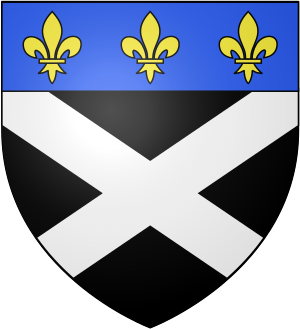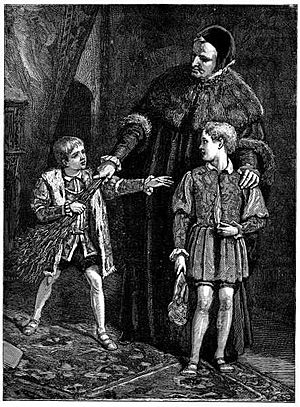Barnaby Fitzpatrick facts for kids
Quick facts for kids
Sir Barnaby Fitzpatrick
|
|
|---|---|

Arms of Fitzpatrick of Upper Ossory.
|
|
| 2nd Baron Upper Ossory | |
| In office 1576–1581 |
|
| Preceded by | Brian Fitzpatrick |
| Succeeded by | Florence Fitzpatrick |
| Personal details | |
| Born | 1535 |
| Died | 11 September 1581 |
| Nationality | Irish |
| Spouse | Joan Fitzpatrick (nee Eustace) |
| Children | Margaret Fitzpatrick |
| Parents | Barnaby Fitzpatrick, 1st Baron Upper Ossory, Margaret Butler |
Sir Barnaby Fitzpatrick, 2nd Baron Upper Ossory (born around 1535 – died September 11, 1581), was an important Irish leader. He grew up at the court of Henry VIII of England. There he became a close friend of Edward, who later became King of England.
Barnaby Fitzpatrick was known for his loyalty and bravery. He helped put down a rebellion in England. Later, he returned to Ireland. He often had disagreements with the powerful Earl of Ormonde.
Contents
Who Was Barnaby Fitzpatrick?
Barnaby Fitzpatrick was the oldest son of Barnaby Fitzpatrick, 1st Baron Upper Ossory. His mother was Margaret Butler. He was born in Ireland around 1535. When he was young, he was sent to England. This showed his father's loyalty to the English King.
At the English court, Barnaby became the best friend of Edward, the Prince of Wales. They stayed close friends until Edward died. Barnaby was even one of the main people at King Henry VIII's funeral. On August 15, 1551, he became one of six gentlemen in King Edward's private rooms.
Time in France
King Edward cared a lot about Barnaby. In 1551, he sent Barnaby to France. This was to help him learn more and improve his education. Edward wisely told him to "behave himself honestly." He advised Barnaby to spend time with gentlemen, not just ladies. Barnaby joked that Edward's care was "more fatherly than friendly."
In France, Barnaby met King Henry II. King Henry made him a Gentleman of the Chamber. This job gave Barnaby a good chance to see how French politics worked. When he left France in December 1552, King Henry praised his good behavior. While in France, King Edward VI often wrote letters to Barnaby. Many of these letters still exist today.
Return to England
When Barnaby came back to England, he helped stop Wyatt's rebellion in 1553. This was a serious uprising against the Queen.
Life in Ireland
Soon after, Barnaby Fitzpatrick went back to Ireland. He was with the Earl of Kildare. In 1566, Sir Henry Sidney made him a knight. Sidney thought very highly of Barnaby.
Barnaby had a long-lasting rivalry with Thomas Butler, 10th Earl of Ormond. This started because Barnaby took action against Edmund Butler. Edmund was involved with a rebel named Fitzmaurice.
In 1573, the Grace family had a conflict with Barnaby. They took his wife and daughter. Barnaby believed the Earl of Ormond was involved. Barnaby asked Sir Henry Sidney for help. He also used a man named Piers Grace to rescue his daughter. His wife was returned safely. But Barnaby and his brothers got revenge by damaging the Earl of Ormond's lands. The conflict between the Fitzpatricks and the Graces continued for many years.
In 1574, the Earl of Ormond made new accusations against Barnaby. Barnaby had to go to Dublin to answer to the council. He successfully proved his loyalty.
Later, Ormond made more accusations against Barnaby. He said Barnaby was "not a naughtier or more dangerous man in Ireland." So, on January 14, 1581, Barnaby and his wife were put in Dublin Castle. However, there was no real proof against him. Sir Henry Wallop believed Barnaby was "as sound a man to her majesty as any of his nation."
Family Life
In 1560, Barnaby married Joan Eustace. They had one daughter named Margaret. Margaret later married James Butler, 2nd Baron Dunboyne. They had two sons, John and Piers.
His Death
Barnaby Fitzpatrick became ill suddenly. He died on September 11, 1581, in Dublin. He was staying at the house of a surgeon named William Kelly. Sir Henry Sidney said Barnaby was "the most sufficient man in counsel and action for the war." He added that it was a "great pity" he died. After Barnaby's death, his lands and title went to his brother, Florence Fitzpatrick.
Historical Writings
Many letters between Sir Barnaby and his friends, including King Edward VI, have been collected. Some were first printed by Horace Walpole. Later, they appeared fully in a book called Literary Remains of King Edward the Sixth.
The Whipping Boy Story
There's a popular story that young Sir Barnaby was Edward VI's "whipping boy." A whipping boy was a child who would be punished when the prince did something wrong. This was because people believed a prince could not be punished. This story shows how close their friendship was. However, historians say there isn't much proof from that time to support this idea. It might be a popular myth that came about later.
Barnaby in Movies and Books
Sir Barnaby Fitzpatrick has been shown in several movies and books:
- Albert Davies played him in the 1936 film Tudor Rose.
- Robert Arthur played a teenage Barnaby in the 1953 film Young Bess.
- He appears in the book Heirs of Squire Harry (1974).
- He is also in the young adult novel Timeless Love (2002) by Judith O'Brien.
See also
- Baron Upper Ossory
- Mac Giolla Phádraig dynasty
- Upper Ossory
 | Jackie Robinson |
 | Jack Johnson |
 | Althea Gibson |
 | Arthur Ashe |
 | Muhammad Ali |


